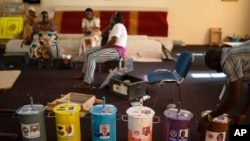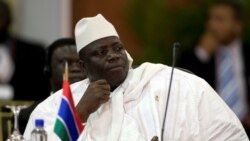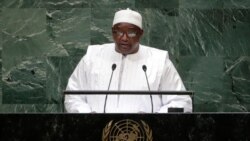Gambian voters will head to the polls on Saturday in the first presidential election in 27 years that does not have exiled former strongman Yahya Jammeh’s name on the ballot.
Jammeh and the influence of his brutal dictatorship has loomed large over the campaign. He took power in a 1994 military coup and held it until losing the presidency to Adama Barrow in the 2016 election.
Jammeh fled with his wife into exile in Equatorial Guinea in 2017 and is backing a coalition in this election run by opposition candidate Mama Kandeh, who finished third in the 2016 vote.
Six presidential candidates are on the ballot, including Barrow, who is running for a second term despite promising during his first campaign not to seek re-election.
"Adama Barrow destroyed everything good I left for Gambians to benefit from — the hospitals, agriculture and education," Jammeh said, speaking by telephone to an opposition campaign rally last month. "We should all unite and vote him out."
Gambia's Truth, Reconciliation and Reparations Commission, established by Barrow, reported in late November that at least 240 people died under Jammeh's bloody rule.
The commission heard months of testimony from hundreds of people who reported arbitrary arrests, unlawful detention and killings, torture, forced disappearances and sexual violence allegedly committed by Jammeh and his accomplices.
The commission recommends prosecution of Jammeh and former officials.
"The country is struggling to break away from the past, to leave Jammeh behind because of the massive alleged human rights violations," said journalist Modou S. Joof. “Yahya Jammeh still commands a great deal of respect from his supporters."
Election watchers say surveys show voters are wary of Jammeh's political influence but also cite dissatisfaction in the current government.
"Our survey also shows that six in 10 Gambians say the government should seek the extradition of former President Jammeh," said Sait Matty Jaw, who leads polling for the survey group Afrobarometer.
Surveys also show that support for the Independent Electoral Commission, charged with administering Saturday's vote, is split between government backers and opposition parties.
"As expected, more supporters of the ruling party tend to trust the [commission] more compared to those in the opposition,” Jaw said.
Many Gambians are questioning whether the election will be fair, pollsters say. Barrow's decision to seek a second term, breaking a promise not to run again, has been a polarizing factor, analysts said.
But while distrust of the election process is high, Gambian journalist Sarjo Brito said this election differs from past ones.
"I think when we talk about the democracy part, the only thing that comes to mind is that now we can stand out there and openly share our opinions," she said. "Now our political leaders can be out there and say whatever they want to the Gambian people.”
Election commission spokesman Pa Makan Khan urged Gambians to have confidence in the voting process, The commission will deploy more than 6,000 monitors at polling stations nationwide.
“I can say that the commission is fully prepared to conduct these elections," he said.
VOA's Kathleen Dawson contributed to this report.






